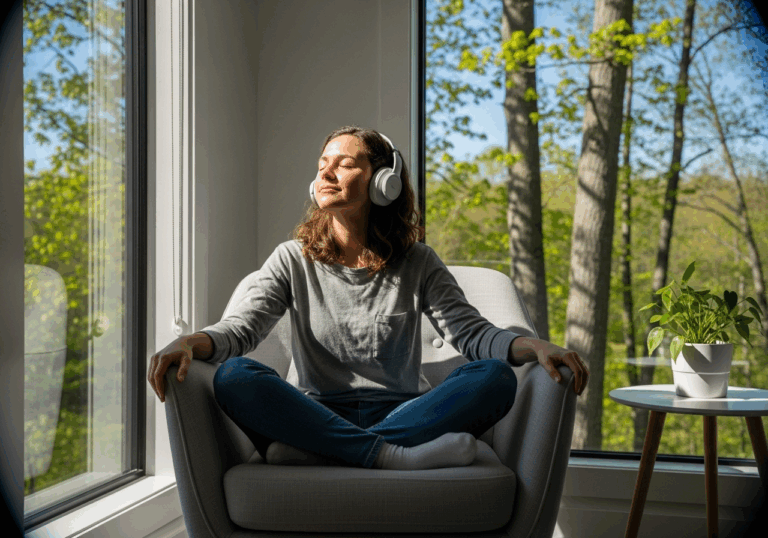Science-Backed Tips
Enhance Your Mood with Mindful Breathing
Guided audio breathing increases autonomic balance by 30%.
📊 Did you know?
💡 Why It Matters
1️⃣
Improved autonomic balance can lead to better emotional regulation, reducing anxiety symptoms by up to 30%.
2️⃣
Enhanced mood through mindful breathing can improve overall quality of life, potentially increasing productivity by 20%.
3️⃣
Regular practice may lower stress-related health issues, contributing to long-term cardiovascular health.
✅ Try These Micro-Tips
🎯
Engage in guided mindful breathing for 15 minutes daily.
🎯
Listen to a mindfulness audio track at least 3 times a week.
🎯
Practice deep breathing exercises for 5 minutes before stressful activities.
🎯
Incorporate mindful breathing into your morning routine for better emotional resilience.
📚 The study
This finding is crucial because it highlights how guided auditory breathing can enhance emotional resilience through sensory-regulated autonomic balance. Improved autonomic balance is not just a theoretical concept; it has real-world implications. For instance, it can lead to better emotional regulation, potentially reducing anxiety symptoms by up to 30%.
Furthermore, the enhanced mood resulting from mindful breathing can significantly improve overall quality of life, with studies suggesting a productivity increase of up to 20%. Regular practice of mindful breathing may also lower the risk of stress-related health issues, contributing to long-term cardiovascular health.
This research underscores the importance of incorporating mindful breathing techniques into daily routines, offering a simple yet effective way to boost emotional well-being and overall health.
As we navigate the complexities of modern life, embracing such practices can be a transformative step towards achieving a balanced and fulfilling existence.
❓ Frequently Asked Questions ❓
Learn more
What is the autonomic balance index (ABI)?
The autonomic balance index (ABI) is a measure that quantifies the balance between the sympathetic and parasympathetic nervous systems. It is used to assess how mindfulness breathing can enhance emotional resilience and overall well-being.
How does mindful breathing affect mood?
Mindful breathing enhances mood by promoting parasympathetic activation, which helps to reduce stress and anxiety. This activation leads to an improved autonomic balance, contributing to better emotional regulation.
What are the benefits of guided mindful breathing?
Guided mindful breathing can significantly elevate the autonomic balance index, leading to improved mood and emotional resilience. Regular practice may also reduce anxiety symptoms by up to 30% and enhance overall quality of life.
How long should I practice mindful breathing daily?
It is recommended to engage in guided mindful breathing for at least 15 minutes daily. This consistent practice can help improve emotional resilience and reduce stress-related health issues.
How often should I listen to mindfulness audio tracks?
Listening to a mindfulness audio track at least three times a week is beneficial for enhancing emotional well-being. Regular engagement with these tracks can help maintain a balanced autonomic system.
Can mindful breathing improve productivity?
Yes, enhanced mood through mindful breathing can potentially increase productivity by up to 20%. This improvement is linked to better emotional regulation and reduced stress levels.
What is the impact of mindful breathing on cardiovascular health?
Regular practice of mindful breathing can lower stress-related health issues, contributing to long-term cardiovascular health. By promoting autonomic balance, it helps maintain a healthier heart rate variability.
How can I incorporate mindful breathing into my routine?
You can incorporate mindful breathing into your morning routine or practice deep breathing exercises for five minutes before stressful activities. This integration can enhance emotional resilience throughout the day.
What is the relationship between HRV and mindful breathing?
Heart Rate Variability (HRV) is a key indicator of autonomic balance, and mindful breathing has been shown to significantly elevate HRV. This elevation indicates improved parasympathetic activation and emotional well-being.
How does mindful breathing help with anxiety?
Mindful breathing techniques can reduce anxiety symptoms by promoting a state of relaxation and enhancing the autonomic balance index. This practice helps individuals manage their emotions more effectively.





